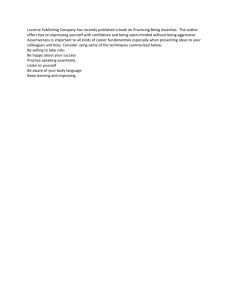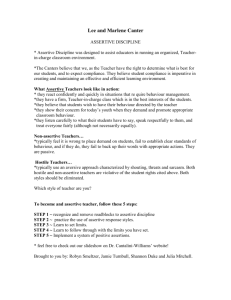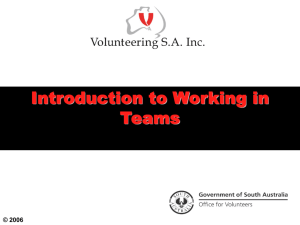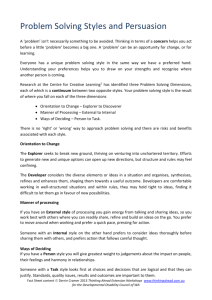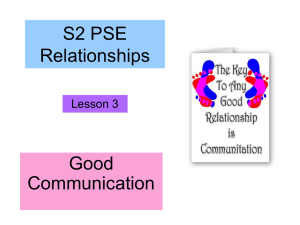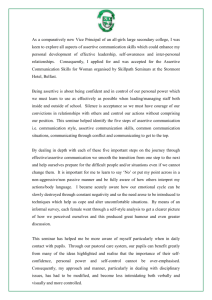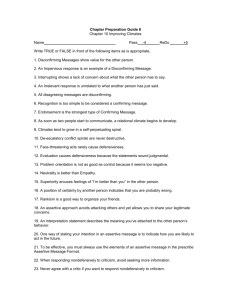assertiveness
advertisement
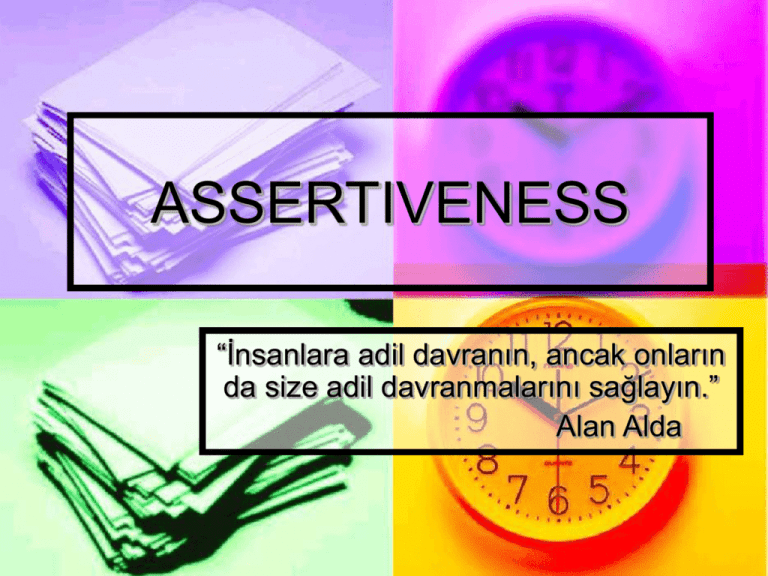
ASSERTIVENESS “İnsanlara adil davranın, ancak onların da size adil davranmalarını sağlayın.” Alan Alda 1-HISTORY OF ASSERTIVENESS Socrates Smith-1975 Today 2-WHAT IS ASSERTIVENESS? Assertiveness is about self confidence which means having a positive attitude towards yourself and others. Ten Points about Assertive Behaviours 1-It depends on expressing yourself 2-Showing respects to others rights 3-Being honest 4-Indirect and certain 5-Mutual equilibrim and benefit is important in a relationship 6-It is expressing emotions, rights, realities, thoughts and boundaries by words 7-Using non-verbal comminication for sending the message 8-It is not universal, it depends on the position and the individual 9-It is getting social responsibility 10-It is not the nature of the hunamkind, it can be learned Being Assertive 1-Being assertive is focusing on your goal 2-Being assertive is being self-aware 3-Being assertive is being true to yourself 4-Being assertive is building self esteem 5-Being assertive is nurturing yourself. 3-TYPES OF ASSERTIVENESS Non-assertive behaviour I am not ok,you are ok Assertive behaviour I am ok,you are ok Aggresive behaviour I am ok,you are not ok Manipulative behaviour I am not ok,you are not ok Agressive ---Agressive Aggresive---Passive Assertive---Passive Negative attitude and passive behaviour Lack of self confidence and low self esteem Lack of self respect Self putdowns Negative feelings and thoughts about yourself Feeliings of inferiority compared to others Like others to be in control of people and situations Feel guilty towards others demotivated Negative attitude and manipulative behaviour Lack of self confidence and low self esteem Lack of self respect and lack of respect for others Mistrustful and suspicious of others’ motives Negative feelings and thoughts about self and others Feel very wary towards others Dishonest and indirect Twist what others have said Undermine others’ self esteem Depressed and demotivated Negative attitude and aggressive behaviour Lack of self confidence and low self esteem Lack of respect towards others Put others down Feelings of superiority Like to be in control of people and situations Disinterested in others’ thoughts and feelings Feel angry towards others and are quick to blame them Don’t listen to or ask questions Dismissive of feedback Positive attitude and assertive behaviour Self confidence and high self esteem Respect for self and towards others Take responsibility for self Motivated to do a good job İnterested in others’ feelings and thoughts Ask questions Honest and direct Listen to others Ask others for feedback 4-SKILLS OF ASSERTIVENESS a) Broken record b) Fogging c) Negative assertion d) Negative inquiry e) Free information f) Self disclosure g)Workable compromise 5-ASSERTIVENESS BY VERBAL AND NONVERBAL COMMUNICATION “It ain’t what you say, it is the way that you say it” Tonation ‘I will phone you’ – It will be me not any other person ‘I will phone you’ – I will not forget! ‘I will phone you’ – I will not write or visit. ‘I will phone you’ – It will be you,not any other person. Faces and the looks Eye signal Body image Personal space The gesture 6-ASSERTIVENESS IN CULTURES ASIAN Low degree of individualism , nonassertive. EUROPEAN,AMERICAN High degree of individualism , assertive. 7-HUMAN ASSERTIVE RIGHTS The right to express sexuality The right to have needs and desires The right to have information The right to have goods or services which have been paid The right to be independent and to be left alone The right to say no The right to be treated with respect The right to do anything which does not violate the rights of others The right to be assertive or non-assertive The right to make choices The right to change The right to control over body,time and possesions The right to express opinions and beliefs The right to think well of oneself The right to make requests 8-SAYING ‘YES’ OR ‘NO’ Why is it difficult to say no? If I say no,they may feel hurt or injected If I say no this time, they may not like me anymore If I say no this time,they may never ask again They won’t take any notice if I say no They would say ‘yes’ to me (and so I will feel guilty if I refuse them) I can’t say no, because I feel sorry for them How to say ‘no’ assertively? Start your reply with a clear,firm,audible ‘no’ Do not justify or make excuses.Giving a reason is different from over-appologizing Feel that you have a right to say no Once you have said ‘no’ , do not stay around waiting to be persuaded to change your mind.Make a definite closure by changing the subject,walking away, continiuing with what you are doing-whatever is appropriate How to say ‘no’ assertively? Remember you are saying ‘no’ to that particular request,not rejecting the person If the request takes you unawares or you have not sufficent time to think when asked,you can always say, ‘I will let you know’ in order to give yourself time to think about what you want to say Take responsibility for saying no-do not blame the other person for asking you Ask for more information if you need it in order to decide whether you want to say ‘yes’ or ‘no’ Why is it difficult to say ‘yes’? I don’t deserve it They might not really mean it I am not really sure that is what I want I don’t have enough information How to say ‘yes’ assertively Say ‘yes’ clearly and definitely Identify why you would find it difficult Examine thoughts realistically and ask yourself Having calarified thughts for yourself then reaffirm your desire to say ‘yes’ Combining ‘yes’ and ‘no’ ‘yes’ and ‘no’ may be combined assertively to define what we want or what our limits are in a particular situation. 9-THE IMPORTANCE OF ASSERTIVENESS IN ORGANISATIONS Assertiveness Personal identity Wages or salary Satisfaction from exercising skills Satisfaction from helping people Social environment Need to dealing with Theirselves The manager to whom they report Their colleagues Their subordinates Clients or customers 10-ASSERTIVENESS TRAINING IN WORK PLACE Body-language awareness leading to work body oriented therapies Role-plays and then work in psyhcodrama Awareness of other people’s perceptions and so work in sensitivity groups and encounter Looking at situations in the past where one was, or was not assertive and hence traditional psychoteraphy Techniques in Assertiveness Training Verbal communication Non-verbal communication Anxiety reduction and control Anger reduction and control, and redirection of this energy Increase in self esteem Awareness of self and others in interpersonnal situations Awareness of social and cultural rules of behaviour Problems in Assertiveness Training The first major problem for assertion training involves negative evaluations of assertive people by others Confusion between assertion and aggression Problem involves transfer of training,the difficulty experienced by trainees in generalising assertive from the training context to real-life situations Finally some of the difficulties in applying assertion training outside the training context may be due to intuitive training procedures that are inadequately based in research The skills of helping the person to commit to changing his/her behaviour from nonassertive to assertive. You will need action planning skills at this stage of the counselling process.In particular, you need to help the person set clear objectives;a mnemonic which can be useful is SMART. This stands for: Specific Measurable Achievable Realistic Time oriented TO DECİDE WHEN TO BE ASSERTİVE Do you know really what is the situation? How much importance it has for you? Will you get what you want? Do you want to just express yourself? What is your options? Do you want an optimistic result? Are you ready to be assertive? Did you count to the 10? Is it beter to wait? Will you get anger to yourself, ,f you don’t do anything? Have you done your best? What are the possible results and risks? Will assertiveness cause a change? Prepared By; Ahmet Gürbüz Mehmet Mutlu Bayram Mustafa Giray Zerey THANKS FOR YOUR ATTENTION
